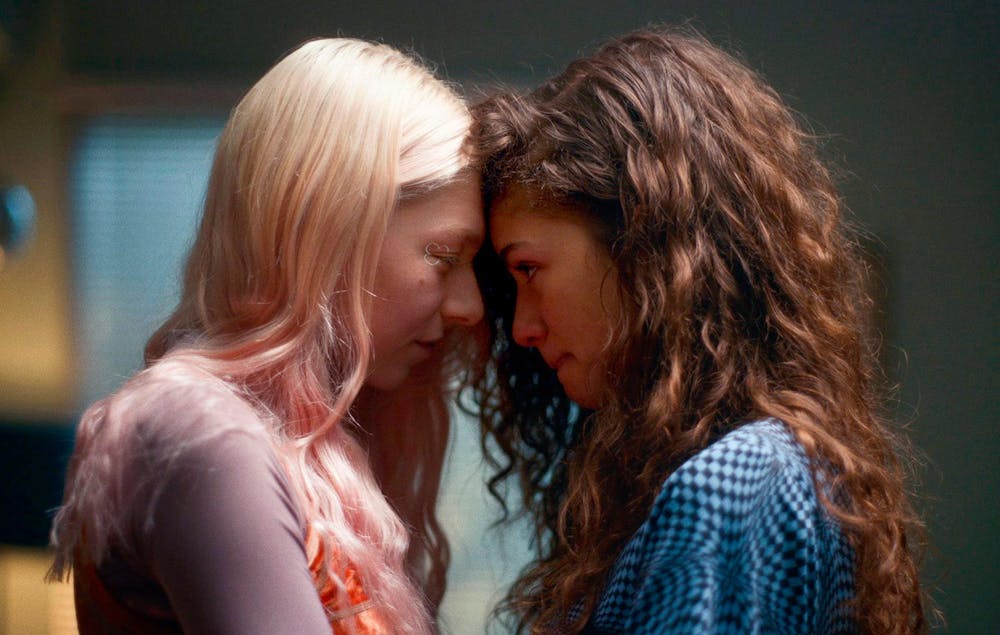Last summer, I made the dreadful mistake of watching an episode of HBO’s “Euphoria” with my 77-year-old grandmother; during one particularly graphic sex scene, she shielded my eyes and exclaimed, “What is this, pornography?!”
On the whole, most adults over 40 are quite unnerved by the ease and fluidity expressed by young people today in orchestrating noncommittal sexual interchanges, both on screen and with our expert use of apps like Tinder, Bumble, and even Instagram. My grandmother’s aversion is in part motivated by preemptive fear: The sleaziness of straight men is a widely accepted phenomenon. Many fear that handling sex with nonchalance is a recipe for disaster, bringing about an inevitable storm of mistreatment and abuse. This preparatory defensiveness is, however, incredibly counterproductive — rather than serving as a method of protection, it excuses misbehavior because men are aware that this is expected.
Generations preceding my own — my grandmother’s included — do not consider the sense of agency that naturally occurs as a result of casual acts of sex. When a woman my age has sex, she no longer gives a piece of herself away; sex has become a mutual act. It is now the norm to equally participate, to give and receive. In our de-emphasis of feminine vulnerability, we hold men to higher standards. It is not the expectation to be taken advantage of or lack leverage; instead, that is the exception, and a dynamic that will be vehemently condemned, in stark contrast to the former shrug of tired concession.
Shows like “Big Mouth” exemplify the ways in which our generation approaches sex. The animated Netflix original follows a group of middle schoolers grappling with raging hormones and the start of puberty. My favorite episode is titled “Girls are Horny Too,” during which Jessi, a seventh-grade girl, comes to terms with her budding sexuality. “Big Mouth” openly promotes discussions of horniness, masturbation, and the combination of shame, surprise, and eventual confidence that consequently emerges. “Big Mouth” works to eliminate the gatekeeping of sexual exploration from middle and high schoolers, which is truly unprecedented in popular entertainment.
I watched “Big Mouth” with my co-ed group of high school friends as soon as it came out. Neither my male nor female friends chafed at the explicit episode: Albeit in cartoon form, this acceptance allowed the female identity to coincide with ownership of promiscuity, rather than the two being mutually exclusive. To understand women not as fragile or prudish but as equally sexually motivated individuals is to promote an assumption of strength and adaptability.
“Big Mouth” is one of many programs that has broadened formerly “masculine” conceptions of sex, and has promoted a hook-up culture among young people that is more balanced. Men are no longer assigned the trait of animalism, and women are no longer delicate; both participants possess an equal combination of both of these qualities.
This reality was reflected in my conversations about sex in high school. My freshman year, my female friends confused and surprised me. They had suavely navigated the awkward beginning of their sexual awakenings without suffocating under the pressure of serious romance in order to develop their lists of sexual conquests. Rather, they had orchestrated no-strings-attached make-out sessions with boys who seemed normal and, most of the time, fairly attractive. In hindsight, these accounts were perhaps not quite as grown-up as I thought they were from the back row of my biology classroom, but they promoted a confidence in my promiscuity that has lasted the duration of high school, and I hope for much longer than that.
However painful it may be for me to admit, I do recognize that I must not be naive in my wish that all straight men will recognize straight women as their sexual equals — I am well aware of the constant risk of assault I am faced with as a young woman. My father repeatedly implores me to take self-defense classes in efforts to ward off the unimaginable, but very likely, threat of a dangerous sexual encounter. I have always been opposed to taking these classes, because I feel it makes me seem as though I am accepting my inherent inferiority. I hope to eventually swallow enough pride to attend one of these classes, because I know that it will only make me stronger. I do hope that one day, though, the knowledge of escaping from a large man’s rough grip and kicking him in the groin will not be a necessary skill set for women. The first step of the very, very, very long journey to accomplishing this is, in my mind, continuing to encourage the weightlessness of sex among young women.

Although I have yet to live on Princeton’s campus, I expect that my female colleagues will likewise conduct their sex lives with comfort; in my mind, this is a sign of self respect, and self respect is a sign of intelligence, of which there is no shortage among young Princeton women. If one can recognize one’s own worth, one can recognize one’s strength; strong people do not let ungrounded timidity encourage disrespect and dehumanization from others.
Some may argue that the death of chivalry and modesty is upon us, but I refute that the antiquity of sexual gravity is synonymous with the birth of female agency. I belong to the generation that has led the charge on securing self-assurance and confidence in sexual prowess for young women, and I couldn’t be prouder.
Andi Grene is a first-year from New York City. She can be reached at agrene@princeton.edu.









